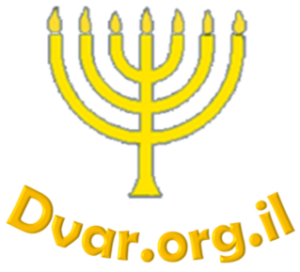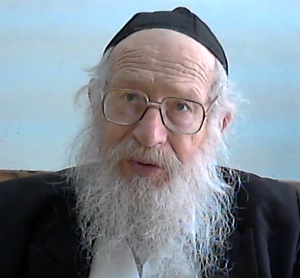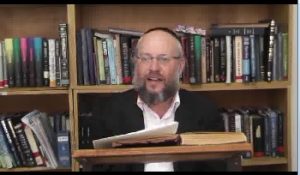 The Sacred and the Secular
The Sacred and the Secular
Part TWO
The Sacred and the Secular
Part TWO
by Ray Baruch Horovitz
Adapted from a series of lectures delivered at the
Continued from the previous issue, J.S.M. No. 18
V. “SHEMA YISRAEL” — ITS MEANING
Hear 0
It is these two concepts of HaShem and Elokim which have as their corollary that we, who stem from Him, should give ourselves back to Him; which is what אהב means, because הב means to give, and with the Aleph it means to give the personality. You must give yourself back to HaShem Elokim, who has created you, because G-d has also produced man with a double aspect, with a transcendent aspect and an immanent aspect. The Yetzer Hatov, the good inclination, is transcendent, an emanation of light that comes from above, a breath that comes from G-d into man, ויפח באפיו נשמת חיים. The Yetzer Harah, the evil inclination, is produced by עפר מן האדמה which is also a creation from HaShem, a creation which comes more indirectly through the power of darkness, which HaShem has created in order that you should give it back to Him. Therefore, you must serve HaShem בכל לבבך- בשני יצרך , with your good as well as your evil inclination, and ובכל נפשך, you must serve Him with the totality of your soul power, at various levels.
True Soul Power
The first soul power is the one that is apparent in the moral and religious faculty of man. The medium soul power is apparent in the emotive life force, the one that registers from a sense perception. Then, there is the soul power which exists within man’s instincts, in his animal and vegetable life force. You should love HaShem בכל נפשך since HaShem is the unifying Being who has created the total universe and has also created the total man in whom there should be no divisions between the יצר הטוב and the יצר הרע, no divisions between the levels of his Nefesh. בכל מאדך with all your means, with all those aspects of your life which are related to your environment. In these threefold aspects of the human being you must learn to unite your life in the service of HaShem and, thereby, remove dualism as well as pantheism from your own life.
There are people who do not believe in dualsim or pantheism but who, in their lives, act as pantheists or dualists. The person who sometimes worships G-d and sometimes worships Caesar is a dualist in practice although he may declare his belief in the unity of HaShem. A person who follows HaShem when he is in synagogue or on Shabbat and, then during the week in his business life, follows the ambition to become rich or purses his own selfishness and does not care for anyone else, not imposing divine authority upon his business life, thereby is a dualist in practice although not by belief. A person who allows such inconsistencies to rule him is פוסח על שתי הסעיפים, “halting upon two branches,” as the People of Israel did in the time of Achav. Eliyahu reprimanded Israel then and said, “How long are you going to hesitate and jump from one branch to the other, sometimes worshipping G-d and sometimes worshipping Baal (idolatry), sometimes following your own indulgence and at other times worshipping G-d.” These are the dualists.
Sometimes, people declare their belief in G-d, but in actual fact follow the whims of their nature under the doctrine of “back to nature.” They do whatever comes naturally without imposing any type of discipline upon their lives. They are pantheists in life, if not in belief.
VI. THE DYNAMIC CONCEPT OF HOLINESS
The דמדום שכינה previously described (see J.S.M., No. 18, p. 9), has created the tension between the sacred and the secular. The Hebrew word for secular, חול, is related to the word חלל which means a vacuum. The apparent vacuum was created by Hashem in order that it should be filled with G-dliness. Similarly, the Hebrew word for dark חושך is connected with the word חשק, which means to keep back, withhold, deny. It expresses the same idea that the apparent non- identity of darkness was created so that it should be filled with light, thus spiritual reality. This produces the challenge for man to lift up the sparks of holiness which are hidden in the apparently secular world העלמת נצוצות דקדושה. Every area of life is filled with the potential of holiness. Man has been put into this world by HaShem in order to transfer the potential holiness into an actual dynamic force through a godly and holy life.
In Yeshayahu, Chapter 6, we are told of his great vision. “I saw HaShem sitting on a throne, high and exalted, and its lower end filled the temple…. And one called to the other and said, ‘The Lord of Hosts is holy, holy, holy, the fullness of the whole earth is His glory’.” This teaches us the double aspect of G-d’s relationship to the universe described above, namely His transcendence and His immanence. G-d as Creator means that He is above the universe and also that His Being pervades the universe. He surround all the worlds and fills the worlds.
The Four Worlds of Reality
The Kabbalists (Tanya 49) say that the threefold mention of the word Kadosh in this verse refers to the transcendence of HaShem in relationship to the four worlds of עשיה, יצירה, בריאה, אצילות. As a simplification, we may say that the first is the world examined by the scientists, the world of fact. The world behind it is that which is appreciated by the aesthetic sense, the world of the artist, the world of form. The best photograph cannot convey such true reality as the artist who goes beyond the world of fact and reveals the world of form. The world of creation is where the realisation arises that the forms which lie behind concrete nature are the expression of a supernatural Creator, who brings it constantly into existence. The zaddik is aware of the עולם הבריאה. When he sees a scene of beauty, he neither takes a photograph nor is satisfied to express himself in art, but instead he blesses the Creator. Beyond this lies the world of pure spirit, the world of G-d Himself. Therefore, when we use the word Kadosh three times, we say G-d is transcendent, separated, He lies beyond the world of fact of form and creation — the Creator stands above His creation.
This is the significance of ד' צבאות. He is the G-d Who has designed and set out in orderly fashion, דבא (connected with the root צוה to command), the whole of the universe. He is HaShem, the Master and the Source of all existence, Who stands above His creation. “The whole earth, the fullness of the whole earth, is His glory.” He pervades the whole of the universe, which is filled with His pervasive Being and essence. G-d stands above Creation and resides within Creation.
Man has been created in the image of G-d. It says in Vayikra (Leviticus) 19:2, “You should be holy, because I, HaShem, am holy.” The same creative power shown by G-d’s transcendence and immanence in relationship to the world has also been granted to man. Our Sages say: “Just as G-d created the world so also man can create worlds.” His soul is an emanation from the Kedusha of Hashem, stands above and also pervades his materialistic being.
The Talmud (Berachot, 10) says: “Let my soul bless HaShem” (Tehilim 103—4 — mentioned five times). In the same way that G-d fills the universe, so also the soul fills the body. In the same way that G-d sees and is not seen, so also the soul sees and is not seen. As G-d sustains the world, so does the soul sustain the body. As He is pure, so is the soul pure. As He dwells in the innermost chambers, so does the soul. In the same way that G-d is master of the material universe, so man must be master of his material universe. The microcosm of the human individual reflects the macrocosm of the relationship of G-d the to world. And, therefore, man should strive to reach Kedusha, holiness, by allowing his soul to rule his materialistic nature, to stand above it and separate from it, and then to pervade it, with its higher aspects of spirituality, instead of becoming submerged and enslaved to its materialistic elements. This is the double aspect, then, of Kedusha. It means first of all an act of separation, a situation of being separate from the universe, or in the life of man being separate from the materialistic aspects of life, and then pervading the universe with Kedusha, pervading the materialistic nature of man with the higher concept of holiness.
VII. KEDUSHA AS SEPARATION
Rashi says on the verse “קדושים תהיו” (Ye shallbe holy) (Yayikra 19:1): separate yourself from sexual immorality and from sin. The Ramban quotes Torath Cohanim, which just comments “Separate yourselves”, and adds “והתקדשתם והייתם קדושים כי קדוש אני” Just as I am holy, so you should be holy. Just as I am separate, so you should be separate. The Ramban’s opinion is that the separation referred to here does not mean separation from forbidden unions, as Rashi says, but for the reason that the masters of the Talmud are called the Perushim. The Torah has permitted a person to conduct marital life with his wife and to eat meat and drink wine, although it has forbidden other unions and foods. So a materialist may say, “The Torah nowhere says that I may not indulge in my material desires as much as I wish, as long as it is with my wife. It does not matter how much I eat; I can eat ten-course meals, day by day, as long as they are all kosher. Nowhere does it say that I may not be a glutton or a person addicted to wine. Nor does the Torah say anywhere explicitly that I may not speak about matters of vanity.” As a result of this a man might become a “base man by permission of the Torah”, נבל ברשות התורה, a rogue who indulges in his selfish desires and still keeps, apparently, to the letter of the law. Therefore the Torah says, No. “Perushim Tihyu”, “Kedoshim Tihyu” — I do not allow this. You have to learn to strive for sanctity, not to pursue luxuries, not to be over-indulgent of your normal appetites, but you should sanctify yourselves in all aspects of material life. This is why the Sages said, והתקדשתם – אלו מים ראשונים — this is the water with which one washes the hands before the meal, to teach one the concept of sanctity which needs to accompany a kosher meal והייתם קדושים – אלא מים אחרונים— this is the washing of hands after the meal, the feeling one has to have when arising from a kosher meal is to remain holy. קדש עצמך במותר לך – make yourself holy within that which is permitted to you.
According to Rashi and the Ramban, Kedusha means transcendence. For you have to consider the effect it has upon you as an individual and apply the principle of moderation. Althought the objective external aspects of the Shulchan Aruch have been fulfilled, there is a higher dimension of true sanctity which has to be applied according to the stage which you have reached in striving to reach closer to HaShem.
IX. POSITIVE KEDUSHA
But there is another aspect of Kedusha: to allow sanctity to pervade materialistic life.
Why marriage is called Kidushin? Certainly, marriage is involvement in material aspects of life? A holy man is surely a hermit, who cuts himself off from all aspects of conjugal activity. The holiest man in other religions is one who follows celibacy. But in the Torah the holiest man, the Cohen Gadol, has to be married when he is engaged in Divine service. Indeed, on Yom Kippur, a second possible wife was prepared for him so that in case his wife should die on Yom Kippur he would still be married. On the holiest day of the year, he has to bring an atonement for the sins of the people, which he can only do if he is in a married state. That is why the term for marriage is Kidushin.
The Talmud (Kidushin, 2b) states that the expression Kidushin, means דאסר לה כהקדש, he makes his wife forbidden to the whole world like articles and food dedicated to the
The Talmud says the term Hekdesh is based on the phrase “all people separate from it”, not to use it in a profane manner. But there is another explanation of Hekdesh —מקדש לשמים that it has to be dedicated to G-d and pervaded by G-dliness, in a positive manner. The same applies to the husband-wife relationship. Tosfot says (Kidushin 2b), what is the meaning of the words “ הרי את מקודשת לי” which a Chasan says to his Kalah? מקודשת means separated from other men by being dedicated unto me — negative. The simple meaning is united to me, prepared for me — positive.
The husband-wife relationship requires separation from others and positive unification. “Man should forsake his father and mother and be should cling to his wife” (Bereshith 2:24). The same phrase is used for the relationship with G-d, "ואתם הדבקים בה' אלקיכם", “You, who are in close communion with G-d, you live completely” (Devarim 4:4). When man lives in a spirit of Devekus, he feels himself pervaded with the spirit of Hashem, and lives in a situation of “חיים כולכם” — the whole of him is living, he is living in a total fashion. So, also, the relationship of husband and wife must be one of being totally pervaded “ודבק באשתו” — a positive aspect of Kedusha, together with the negative aspect “אסר לה אציע כהקדש”.
How can man reach Kedusha? He must begin with separation, transcendence, and end with immanence, the far more difficult stage of allowing holiness to pervade materialistic life. That is "והתקדשתך" — separate yourselves from materialism, then "והייתם קדושים", then you can reach positive Kedusha. “A person sanctifies himself a little, and then he is sanctified greatly from above” (Talmud).
The Rambam’s Explanation of Kedusha
The Mishna Torah of the Rambam is not only a work of Halacha (law) but also a work of Hashkafa (morals). The Torah’s approach towards faith and values is shown, not only in the first and last chapters, but also in the structure of the “Yad Hachazaka”, The Mighty Hand which the Rambam has given to us. One of the 14 books is the Sefer Kedusha, the book of holiness. What would a book of holiness convey to the Western mind? Prayer and study. But the “Book of Holiness” deals with dietary and sexual laws — אסורי ביאה, מאכלות אסורות, שחיטה. It is introduced with a verse from Tehilim (119:133): “Prepare my steps through your word, and do not allow any iniquity to rule over
The two basic physical powers are reproduction (the drive for sexual activity and the libido) and the drive for self-preservation (egotism). If we leave aside the schools of more spiritual psychology, such as that of Frankel, then there are two basic schools of thought in contemporary psychology: (1) Freud, who, like his name, believed that the pleasure principle, sex or libido, was the major motivation of human behaviour; and (2) Adler who believed that self-assertion, with common by-product of the inferiority complex, was the basic motivation for human behaviour. These are the two drives to Taava (desire) and Gaava (pride), described by the Vilna Gaon as the two powers of the יצר הרע. In truth, they are united. The instinct of procreation is an extension of the instinct for self- preservation. A person wishes to preserve himself as an individual and to extend his individuality to those who come from him. The emotional drive is also connected. The assertion of the ego and the drive to produce further beings related to the ego are inwardly connected. Therefore, there is no clear division between the two — one leads to the other. Bread, לחם, (satisfying physical desire) is also used metaphorically for sex. The Torah recognises the power of both and, therefore, introduces concepts of Kedusha into both these basic drives. The Rambam’s Book of Kedusha, therefore, gives directives to be applied to food and to sex, from which Kedusha can extend to all aspects of human behaviour.
The Two-fold Aspect of Kedusha
ואנשי קדש תהיון לי “You should be holy men unto me; you should not eat Trefa meat” (Shemos 22:30). The word “אנוש” is used throughout the Tanach for the weak man, connected with the root אנוש, to be sickly, ענש — to be punished. Why does it not use the word איש personality, or אדם, men made in G-d’s image אנוש? (דמה) refers to materialistic man, whose drives can lead him to be level of the beast. “You are obliged to raise up your materialistic self to a holy level, unto Me.” Therefore, you may eat meat and follow your drives, but according to the wish of G-d, by first applying the principle of transcendence as separation and, then, the positive pervading spirit of holiness into your materialistic life.
In effect, the Sages said that wherever you find the prohibitions concerning sex, there you find Kedusha, the aspect of separation and of transcendence. But there we also find Kedusha in the positive sense. Marriage is also Kiddushin and Kedusha because the• separation is for the purpose of channeling the dynamic libido of man in a positive way. Freud writes that sexual energy may be sublimated, but if it is used without leading ot its ultimate purpose, it is a perversion of nature. The Torah agrees with this principle and says, Keep away from all stimuli, לא תתורו אחרי לבבכם ואחרי עיניכם and then you will be enabled to channel your energy to the highest level of happiness, sanctity and bliss within marriage. That is Kidushin.
The blessing of marriage, Kidushin, begins: “Who has sanctified us with His commandments and commanded us concerning forbidden marriages” and ends “sanctifies His people
On Sabbath we make Kiddush on wine. This is deduced from זכור את יום השבת לקדשו “Remember the day of the Shabbath to sanctify it” (Shemoth 20:8). This aspect of sanctifying is positive. But, beforehand, comes the acceptance of not working, the negative dimension: “Keep the day of Shabbat to sanctify it” — שמור את יום השבת לקדשו (Devarim 5:12). In order to reach a situation of the positive luminous quality of Sabbath which cannot be defined in words (זכור), we must remove mundanity and forbidden work, Muktsah Uvda DeChol (שמור). We take away the money from our pockets and exclude the television, the motorcars and the mundane aspects of materialistic urban civilization from our environment. Then, we can experience the positive Kedusha of Shabbath. The ultimate aim is the positive Kedusha: the Kiddush on wine which iepresents materialistic joy of the highest level, pervaded by Kedusha. (It is a statistical fact, that Jews who have preserved Jewish tradition are not subject to alcoholism, it is assumed that this is because their drinking of wine is tied to holiness.)
Let us go back to the Beth Hamikdash. There we find also that many of the offerings brought in the
The Prophetic Vision of Kedusha
The prophet Zechariah says concerning the time of war of Gag (Ch. 14:16): “It shall be, that all those who are left from amongst the nations who come against Jerusalem,” and who have recognized the futility of waging a war against Jerusalem and who are ready to recognise the task of the people of Israel to bring the word of G-d to all mankind, “they will come year by year to bow down to the King, the Lord of Hosts, and to celebrate the festival of Succoth”. A Sukka is the opposite of a “Gag”. The roof has to be replaced by sechach, branches, which represent the world of nature which comes from G-d, and not the artificial work of man of bricks and mortar, the artificial civilisation that shelters man. Those nations of Gag based themselves upon ihe sovereignty of the power of man. The Sukka teaches, in contrast, the sovereignty of the power of G-d, who is our true shelter. Zechariah ends his message refering to Messianic times (Ch. 14:20): “On that day there will be upon the bells of the horses, ‘Ho y unto Hashem’,” which is a ieference to the means which human beings use to control thejr environment — these, too, will be dedicated to Hashem. “The pots in the House of the Lord will be like the sprinkling pans in front of the altar, and it shall be that every pot in





